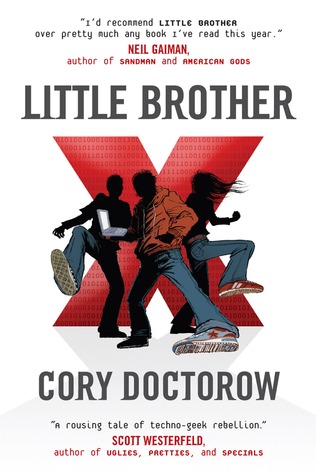Last summer author Cory Doctorow came to Salt Lake to attend
Westercon and, as per my usual at many of these events when it comes to
accomplished authors, I didn’t know who he was. However, during a pause in the
“action” at the convention, Cory was hanging out in the hotel lobby and so some
in my party began a conversation with him. Though I didn’t talk to him
directly, I could tell the guy was very intelligent and well spoken. I thought
this guy’s probably very capable of creating a good story.
Last week the podcast Writing
Excuses played an interview they had with Cory and after hearing that
particular podcast, I was even more impressed. So when a copy of his book, Little Brother came available at the
library, I jumped at the opportunity to read one of his books.
I’m glad I did.
Little Brother
involves a group of teenagers caught in a nightmare of government overreach
following a terrorist attack on San Francisco. One teen, Marcus (the novel’s
protagonist…) uses his computer hacking genius to thwart the government’s attempts
at control after the implementation of “The Patriot Act II.” As the metaphoric
noose begins to tighten around Marcus’s neck, the young man learns about his
own strengths/weaknesses as well as life in general. Basically, he grows up
quickly during a turbulent time.
Stories affect us all differently. Some affect me greatly as
I’m reading them—others after I’m done reading. This one did both. What I found
fascinating is, because I listed to the audiobook version, I didn’t look at the
date the book was published. When I found out it came out in 2008, I was
shocked. This thing could have been written last month. Political jabs seem to
be leveled against the US President that was in office in 2008—points I
personally feel were for the most part justified, but since 2008 we’ve found
out that all of these “fictional” possibilities of government spying and NSA
control have been proven 100% correct, not just the imagination of the writer.
And, to be honest, when it comes to the NSA and a lot of governmental control
issues, things are pretty much the same as they were in 2008 if not worse.
One issue I had with the book, and this is nitpicking to
some degree, is that when a person takes on the whole power of the government,
it’s hard not to look at the situations presented in the narrative and believe
that there’s no way this kid would not be picked up at any time. We know that
all cell phones can be tracked (thus, tracking a person’s physical location…),
all e-mails can be hacked and there are cameras everywhere. I kept thinking
about those things as the story progressed and I wondered if this kid was ever
safe. These issues did not rise to the point where it ruined the story for me.
Reading Little Brother
confirmed what I previously thought of Cory Doctorow—very intelligent, well
spoken and very capable of creating a good story.
* Photo used without permission from: https://www.goodreads.com/book/show/954674.Little_Brother?from_search=true

No comments:
Post a Comment